Review of my Channel journey
It has been a month since I swam across the English Channel from England to France. It was a magical feeling when I walked onto the shore at Le Petit Blanc Nez after entering the sea at Shakespeare Beach 18 hours and 21 minutes before, but the journey was incredibly tough, and it was nowhere near perfection. I made many irrecoverable mistakes during my preparation resulting in 2 years of time and opportunity cost lost, which would be valued at multiples of £4k (the direct cost to swim the Channel). Now as things have settled, it’s time for me to review the swimming journey of my whole life.
My youth
My parents sent me to a swimming class at Luohu Gymnasium (罗湖体育馆) in summer 2005, when I was 12 years old. At that time, transport there was inconvenient so I stayed at a relative’s home nearby in Liantang. (Liantang Port, located next to the gymnasium, opened in 2023 with the associated metro station opened in 2020, making the gymnasium much more accessible now)
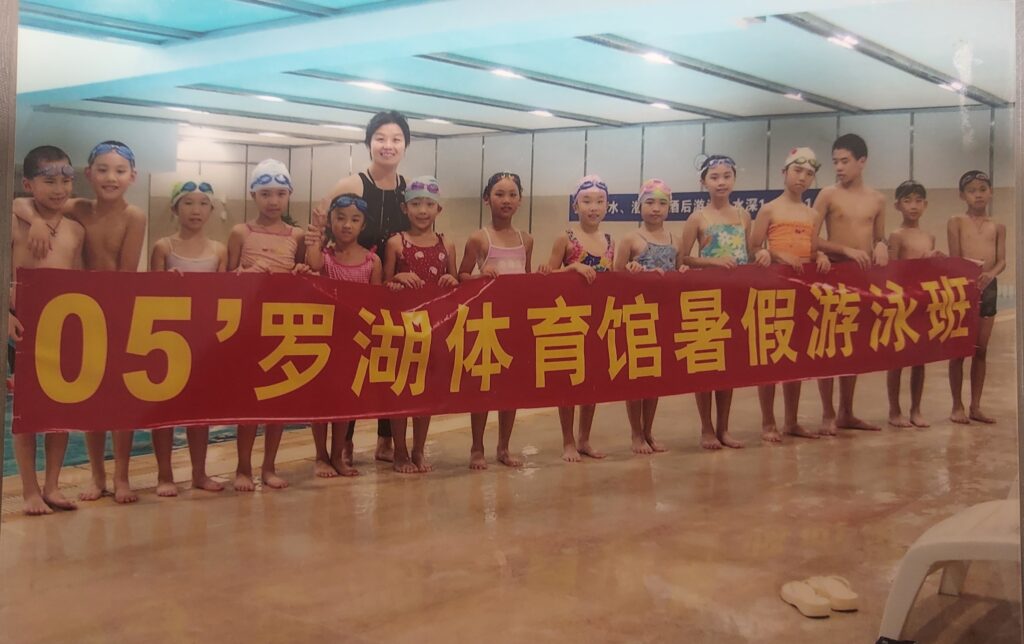
However, despite I learnt how to swim, it didn’t result in any regular swim training afterwards and I wasn’t a swimmer in my youth. That year was the year when I started secondary school. My main extra-curricular activities back then was competitive programming (which I reached international level) and scouting (which nourished my interest in sailing and orienteering, and made me understand myself more through the leadership activities).
I had a high level of water confidence throughout my life. My scout group organised a boat trip every year where we could have fun and learn seamanship skills, and people called me “water monster” as I liked to stay in water for a long time without flotation aids, while others would get tired and sometimes use aids such as pool noodles while having fun. When I became more senior, the leaders would let me be their assistant while having water confidence activities as well.







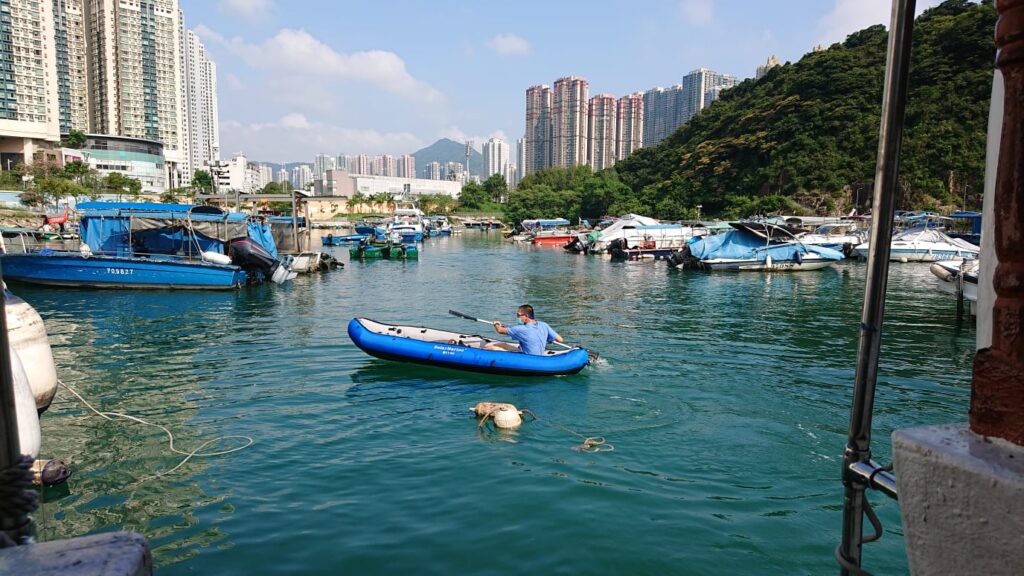
The school I studied at had a few of the best swimmers in Tuen Mun District, and I was impressed by these swimmers (although some of them were bullies in the lower forms). Swimming was one of the few sports where my school was at a high level in the district. In 2010, when I started sixth form (the last cohort of sixth-form education in Hong Kong state education system), I applied to join the swim team in my school, as I hoped to get into a sports team in my final years of my school life (my school didn’t have a competitive programming team and I trained in the Hong Kong team instead), but I wasn’t accepted because I wasn’t fast enough. As a result I didn’t have any swim training during my youth.
The English class in school required me to borrow books in the library, read it and write book reports. At one instance, I picked a book called “Swimming to Antarctica” by Lynne Cox, and I was truly impressed by her swimming adventures, especially the ice-breaking swim from the USA to Soviet Union.
I completed the 2.6 km (stated as 2.4 km by the organiser at that time but corrected to 2.6 km in subsequent years) Tolo Harbour Swimming Race in 2010. It was a choppy day according to experienced competitors and it took me 76 minutes to complete. It was my only swimming race before I started doing aquathons in 2016.
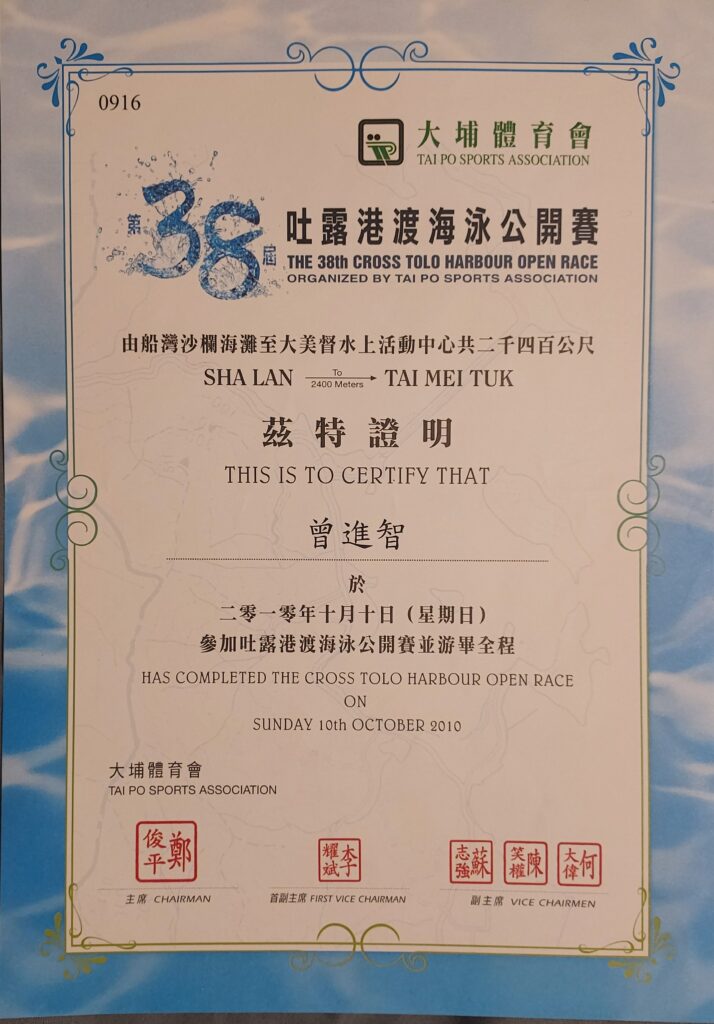
I entered HKU in 2012. There was a swimming club in the university but it didn’t actively recruit members during the orientation day, and I couldn’t find a way to join them. Meanwhile, competitive programming, bridge, sailing and scouting occupied my life back then, and I just started orienteering, so I didn’t put particular effort into other things including swimming.
My first swims
In December 2014, I started to have interest in swimming again and noticed that there was a regular Sunday swim group lead by Ian Polson. The following is my initial email to him:
Dear Ian,
I am interested in swimming, especially OW swimming. Although I can continuously swim for km’s, my swimming speed is painfully slow (about 1’ for 50 m, 5’ for 200 m and 30’ for 1 km). Can you suggest me some way that I can improve my swimming technique? Thanks.
Regards,
Michael
Ian then invited me to join a group swim. However I couldn’t catch up the group and my confidence was totally destroyed, and I hadn’t returned for a long time. Ian then told me to join a club and get training in the pool. I also tried to swim with the Saturday group by Lloyd Mc Bean, where they had the faster A team (1’30” / 100 m or less long-distance pool speed) and the not-so-fast B team (2’10” / 100 or less), but I couldn’t even catch up the B team back then, so I hadn’t returned as well.
I noticed that there was a triathlon training programme by the sports department at the university, called Institute of Human Performance (IHP) back then, so I would like to join (as I also had run training at that time so a triathlon programme would suit me), but at that time the improvers group didn’t operate in the winter and I wasn’t at the level to join the main training squads. The summer afterwards (2015), the improvers group split off to a sister programme outside the university, while I was busy doing my internship so I didn’t have swim training.
I tried again in autumn 2015 but I still hadn’t reached the level to join the squad training. I then started signing up swim classes elsewhere outside the university. The IHP triathlon programme was rebranded to Swim Lab Asia in 2015-2016 winter, and started offering improver courses in the summer afterwards. I did a course in May but I didn’t get enough improvement to meet the squad standard.
I graduated from university in 2016 and started racing aquathons in the same year. My first graduate job was in the university so I still hoped to join the triathlon programme there but I wasn’t up to the squad standard. I trained on my own during the years of 2016 and 2017. The longest swim race I did in these years was 1.5 km as part of aquathon races.
A NOW (New to Open Water) team was added into the Saturday swim group in 2016. I joined once but it was not exactly what I needed as the purpose of that team was to build open water confidence, which I didn’t lack but what I lack was the speed to follow the B team.
The start of my progression
Finally, in summer 2018, I realised that I had got to the level to follow the B team so I returned and started swimming with them every week. That level also allowed me to join some of the squad training sessions in Swim Lab Asia so I started squad training in October 2018, and continued with them until the very last week before I left Hong Kong. I became a member of Tritons Triathlon Club, formed by members in the IHP Triathlon Programme / Swim Lab Asia squad with a large expat member base. I also returned to the Sunday group led by Ian Polson and Edie Hu in 2019.
There was a “race”, stated to be 2.5 km, during one of the regular Saturday swims in September 2018, but it was “upgraded” to 3 km without notice, which ended up becoming my longest non-stop swim at that time. It boosted my confidence and I immediately sign up for the 3.7 km MMIC race when it got rescheduled from September to 3 November. My result was 1:25:45.6. On the same day, Edie Hu swam round Hong Kong while we were racing. I was impressed by her immediately and started calling her my goddess. I continued to train for longer distance until I swam 10 km in a session, then I became ambitious. The following is an excerpt from a post I made in the OWSHK Facebook group:
I would like to build up my swimming gradually, eventually to marathon distance. I completed 3.7 km MMIC in November, and did trainings up to 10 km afterwards. The first challenge for me is cold half – but 2019 is too soon so I am targeting 2020 instead. During this year I have to work on my speed in order to meet the cut off.
If I can complete it, then the next challenge would be the channel, which I am targeting 2021, but, as you all know, this life-changing challenge isn’t to be taken lightly, and it requires determination, preparation and mental toughness to succeed.
I started to read information about long-distance marathon swimming and made a plan for progression until I raced Cold Half in 2020.
I did a video analysis session with Fenella in February 2019.
A plan to perfection
Starting from 2018, I regularly travelled to Europe to participate in trail orienteering World Ranking Events. I started to see if I could incorporate swimming races in my trip as well.
I ended up doing 2 races, Lake Geneva Classic and Bosphorus Cross-Continental Race in one of my trips and got satisfactory results. I also raced Clean Half as a 2-person relay in 2019 with Gary Lui. I was ready to race Cold Half in 2020.
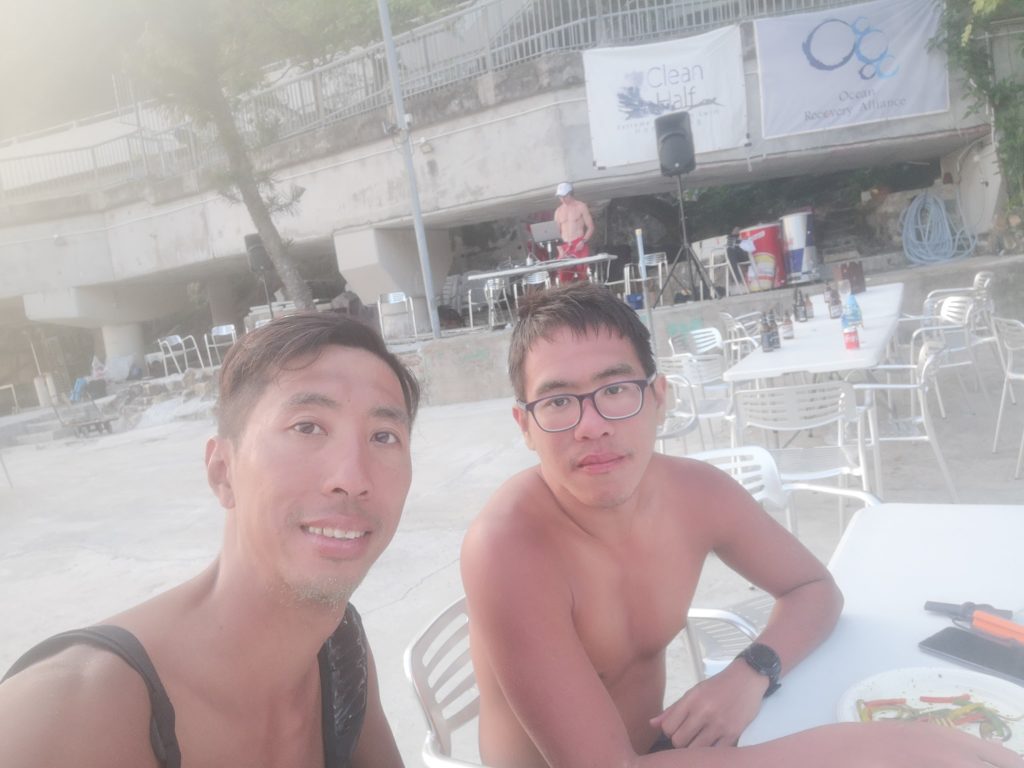
As winter came, I started to put things into my bucket list. I had 4 items in my bucket list, including English Channel, North Channel, Gibraltar Strait and round Hong Kong. I decided I would start off with English Channel and Gibraltar Strait. I would book a slot for English Channel if I could reasonably swim for 6 hours under 16°C, and I would book a slot for Gibraltar Strait if I could keep 3 km/h open water speed for a few hours.
I then made a plan to perfection:
- Book an English Channel slot to swim in September 2021
- Get technique coaching with Fenella Ng immediately after doing Cold Half 2020, and rebuild my technique
- Go to Sweden to do Vidösternsimmet, which is a 21 km race in a lake, to establish my base sustainable speed for long distance swimming
- Leave my job at October 2020, and focus on my preparation for 2020 World Trail Orienteering Championships in Hong Kong scheduled in late November.
- After the world championship, train for endurance and acclimatisation in Hong Kong by swimming in the sea, and also in the unheated university outdoor pool.
- Race Cold Half again in 2021.
- Do a rehearsal swim up to 30 km around February / March in Hong Kong offshore waters with boat support, under the exact same rules as a channel swim.
- Apply for a working holiday visa to a European country (I hadn’t decided Sweden or UK at that moment) and move there in April, providing an uninterrupted extended period of training at suitable temperature from December 2020 up to my English Channel swim, as it would be too hot to swim in Hong Kong after May while the swim season in Europe starts in May. Get a part-time software developer job and keep training.
- Swim the English Channel from England to France.
- Get a full-time job after I become a Channel swimmer, with the intention to get a job which I can get a working visa for, such that I can remain in Europe.
The plan above can be summarised into 3 training blocks by the main focus:
- February 2020 – August 2020: Technique
- November 2020 – March 2021: Endurance
- May 2021 – September 2021: Acclimatisation
I completed Cold Half 2020 on 19 January. Although I hadn’t proved that I could swim for 6 hours below 16°C, as the water temperature was warm in the race, it boosted my confidence so much to continue my plan as I was afraid that all the English Channel slots in 2021 would soon be gone. I paid for the deposit for my Channel swim on 31 January and registered for Vidösternsimmet on 5 February.





Wrecked from the beginning
By then, COVID-19 was already circulating in mainland China, with isolated imported cases in Hong Kong. There was no outbreak in Hong Kong yet. All sports facilities managed by LCSD suspended operation from 29 January for an initial period of 14 days, as a precautionary measure, and the university followed suit as well. I didn’t realise the seriousness of the situation, thinking that it would be similar to the SARS epidemic in 2003 where the deadly virus was quickly contained and extinguished by summer.
According to the plan above, I had to get coached (getting a video analysis session) by Fenella Ng as soon as possible after I completed Cold Half, but it was impossible while the pool closure was in place. The closure of facilities was extended until 2 March. In the meantime, the squad training at Swim Lab was moved to the beach.
Chun Kong Mak announced that he would swim the English Channel in October 2020, hoping to become the first Hongkonger to do so.
By mid March, the virus had spread all over the world. Borders were all shut in a week and a restriction of gathering was imposed. The Olympics was postponed and Wimbledon was cancelled. As I couldn’t get improvement without coaching, I lost the motivation to swim. My weekly volume dropped from 19 km / week before the pandemic to 11 km / week by the end of March, although it went back up to 14 km in early May as I hoped that the pandemic would finish by summer and I could go to Sweden to race.
Facilities were partially reopened in May, however, as capacity was limited, the squad training at Swim Lab Asia was always full, so I joined a training course in another swim club. As the pandemic worsened, everything closed again in July. I could never get a video analysis done by Fenella under the unstable pandemic situation.
The UK declared that China breached the Sino-British Joint Declaration by putting a National Security Law into the Basic Law, and announced that an emigration route would be available to British National (Overseas) citizens from 2021 as a result.
As it was too hot to swim in Hong Kong in the summer for substantial distance, I nearly stopped swimming and only did one open water swim on the weekend. My weekly volume further dropped to 6 km / week only in August 2020. Meanwhile, I supported other aspiring swimmers, such as Isaac Yuen, who weren’t adverse to heat and could swim for long distance instead.



Chun Kong Mak swam across the Channel overnight on 1-2 September 2020, 14-15 seventh lunar month the Ghost Festival, the first Hongkonger to do so. The Law Society team got across 4 days later and became the first Hong Kong relay team to swim the Channel as well.
I swam with the regular Saturday and Sunday groups but I had trouble socialising with them. Sometimes I thought people didn’t understand what I wanted and my concern. My swim buddies suspected that I was autistic. I ended up getting diagnosed and confirmed to be on the spectrum.
Facilities were opened again in September 2020. I started to go back to squad training and pool swimming, gradually increasing the amount as autumn came. My first training block (technique) was gone, but if I could get coached in early winter, I could still squeeze in my technique training during my second training block. Also, the world championship was cancelled as well so I could well use that time for my swim training as well. By November, my weekly volume was 15 km / week and I hoped to build up to 25 – 30 km / week throughout the winter (while my original plan was to do about 25 km / week earlier in the year, and 40 km / week in the winter).
Because Vidösternsimmet was cancelled, and I needed a long swim to establish my baseline speed, I did a 16 km benchmark swim in Tolo Harbour on 15 December 2020, which was submitted to Marathon Swimmers Federation for ratification as part of my work to promote marathon swimming in Hong Kong. I performed badly in that swim which totally destroyed my confidence.
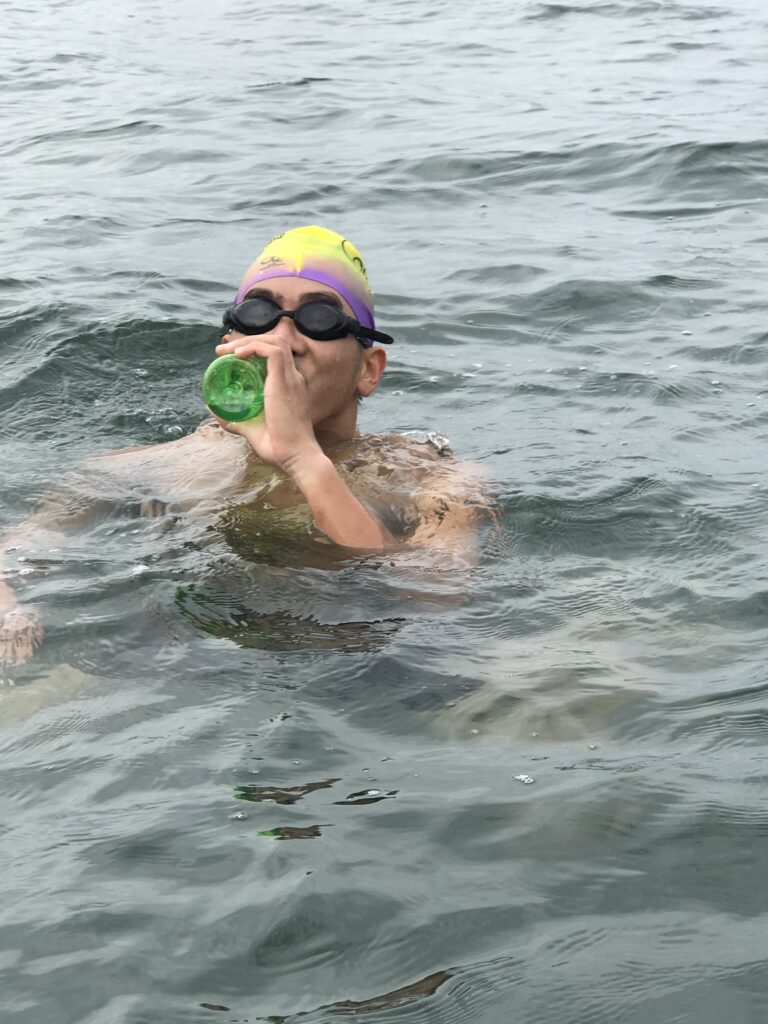
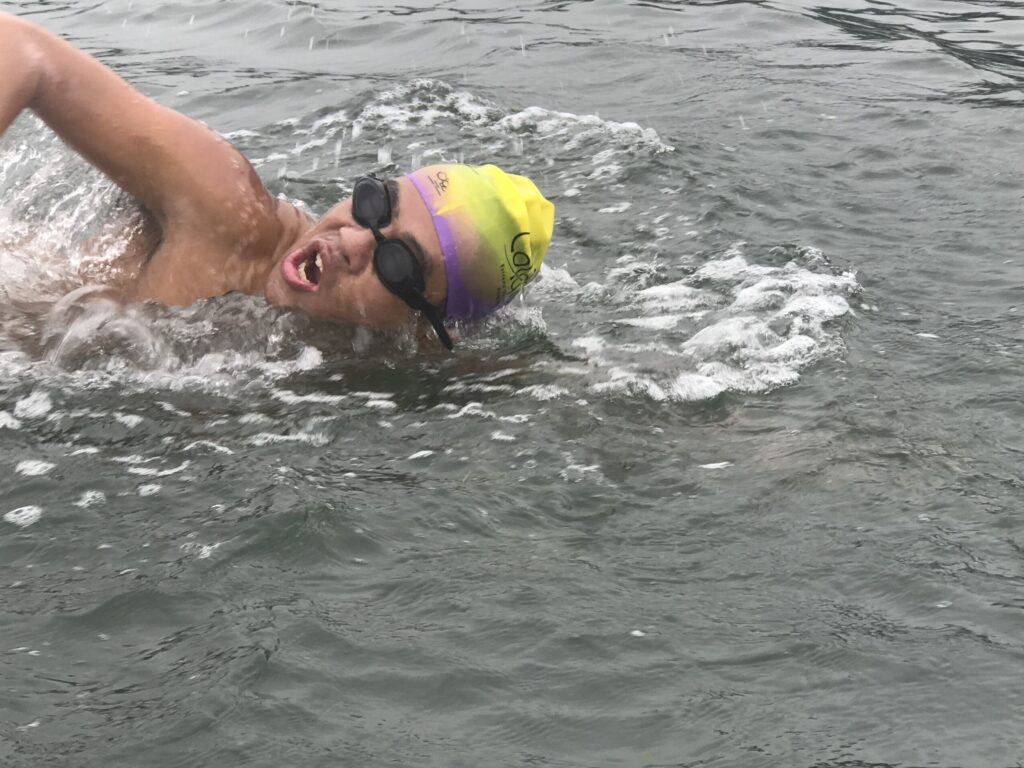
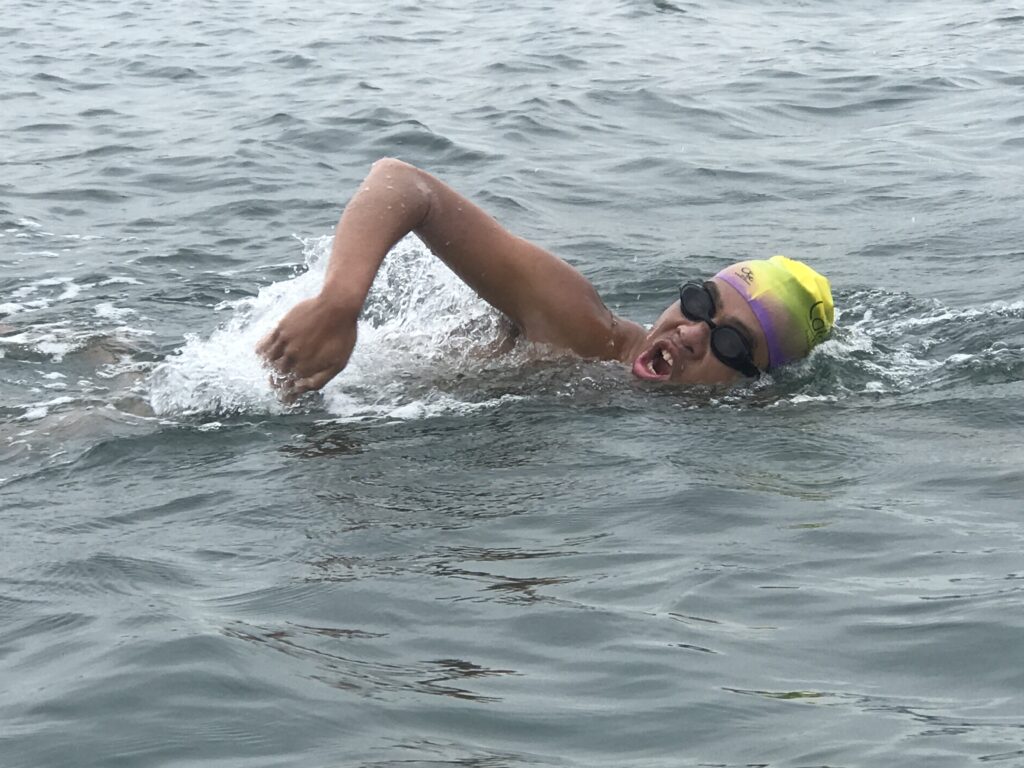
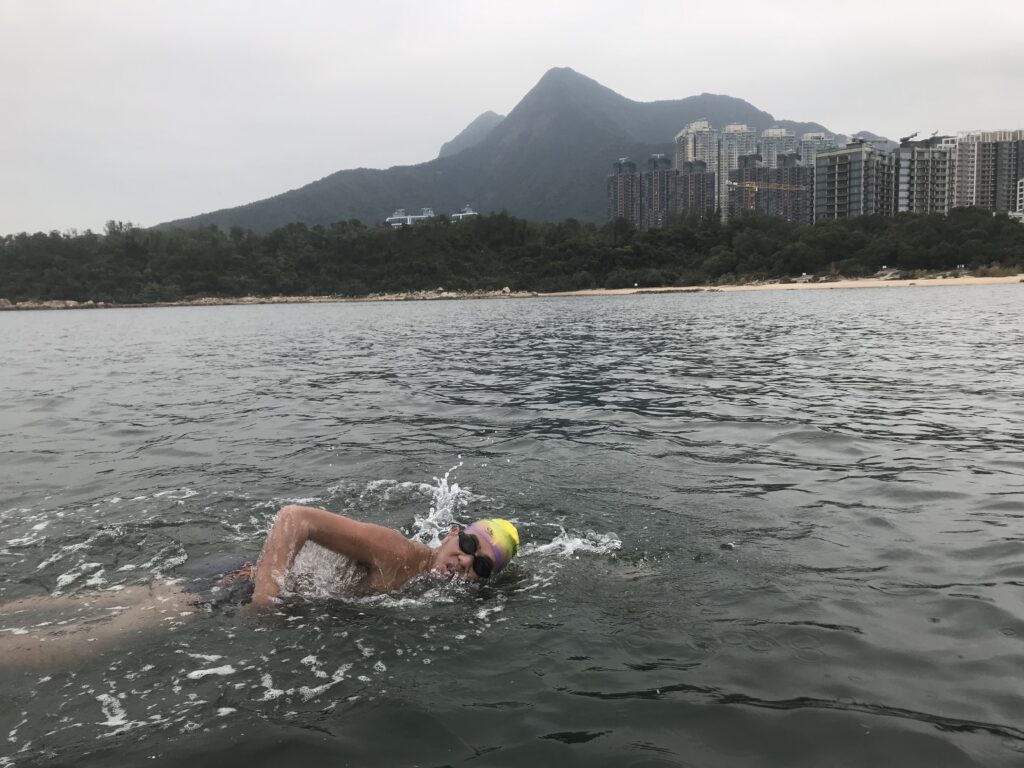
I tried to get the Channel qualifier done in January during a cold wave, but unfortunately I didn’t have enough time to acclimatise and only lasted 3 hours instead of the required 6 hours (however, Allan McPherson, who also planned to swim the Channel in 2021, completed the qualifier in the same cold wave one day after my failed attempt. He refused to train with me because he thought I was too slow, and he fit his swimming around his work compared to that I fit my work around my swimming.). Furthermore, the facilities shut again since the start of December. The inability to train caused me mental problem and I ended up visiting a psychologist, and eventually stopped Channel training.
I didn’t stop swimming but instead changed my training focus to racing, as I would race Cold Half again in 2021. I was introduced to a group to competitive triathletes who normally trained in the pool, but because of the closure, trained at the docks in Tsing Yi North instead. I felt much better when the Channel was taken off my mind, and my weekly volume at that time was about 24 km / week. I got a better result in the race with better feeling as well.
The Hong Kong BN(O) visa application opened soon after the race. If I were to resume my Channel training, I would need to apply as soon as application opened for a timely departure in April. At that time, half of my second training block was lost already and I judged that I would be a year away from being ready to swim the Channel, but the time left was only half a year. However, I got too excited from my good race experience despite the condition on the race day (warm and calm) was nothing like a typical Channel condition and I applied for the visa to the UK, and hoped that I would have a second chance in doing the qualifier before the winter ended. There wasn’t a second chance in the whole winter.
I continued swimming in February and March 2021, averaging 22 km / week, but as the pool closure order was still in place, I couldn’t do any interval training required to build my long-distance endurance speed. The restriction was lifted at the beginning of April but it was already too late – the pool was 27°C already while my target training temperature was 18°C in the winter. I went back to the pool to swim until the very last day while saying goodbye to all my loved ones, and I boarded a one-way flight from Hong Kong to London on 20 April 2021.
The first thing to do after moving to the UK was to decide where I should live. I had two choice in mind at that time:
- South London
- Bournemouth
I chose Bournemouth because of the reason listed in this article but it turned out to be a mistake, and I failed my Channel swim in September 2021. I did my third training block (acclimatisation) well but without technique and endurance training in 2020, I wasn’t fit enough to get across.
Life after the failure
I tried to return to my normal life as soon as possible. I resumed doing orienteering and signed up swimming races I wanted to do, which I didn’t do because I was training for my Channel swim.
The race Vidösternsimmet I signed up in 2020, cancelled because of the pandemic, was postponed to 2021, but because the border was still closed, international swimmers were allowed to postpone again to 2022 which I did. I also signed up for a few BLDSA races in 2022, including Champion of Champions (Dover) and Windermere.
I lost my motivation to swim afterwards, with my weekly volume went down from 28 km / week in July before my Channel swim and 6 km / week afterwards in December.
As life in Bournemouth was miserable, because of the lack of facilities, including swimming facilities (there are no outdoor pools nearby), the lack of entertainment (unlike in a big city), the lack of friends (they live in London), and poor transport links (causing me unable to go to orienteering events nearby), I hoped to move to London as soon as possible. However, I stayed in Bournemouth as I found a software engineering job in my desired industry (public transport) there.
I avoid swimming in indoor pools because they are so hot which makes me extremely uncomfortable. As there are no outdoor pools near Bournemouth, I could only go to a lido very far away, called Guildford Lido, to do my pool training on weekends. Guildford Lido is a heated lido, but it is not as hot as an Olympic-standard indoor pool so I feel good training in it. It is heated to 12°C at weekends in winter. I did very few open water swims throughout the winter because it is not possible to do long-distance endurance swimming in the UK winter, and I didn’t think it was useful at all for training purpose given my Channel failure.
I was interested in forming a Channel relay team composed solely of Hongkongers who currently live in the UK, called “Hongkongers in the UK”. I tried to find as many Hongkongers as possible but unfortunately I could only find one other teammate, Ingrid Chow, who was experienced enough in long distance open water swimming to join the team, despite dozens of thousands of Hongkongers emigrated since 2021. I therefore booked, in December 2021, a relay scheduled in October 2022.
Unfortunately, the company in Bournemouth wasn’t a good fit and I was let go at the end of the probation period, so afterwards I moved to London. As soon as I moved to London, I started having lessons with Ray Gibbs at Swim Canary Wharf.
I was selected to be a Hong Kong team member for the postponed World Trail Orienteering Championships in Poland.
As I registered for a Channel relay and a few races, I continued my pool training to build my endurance throughout spring and summer 2022, doing what I should have done back in November 2020 – March 2021. I didn’t find a job immediately after moving to London as I was busy preparing for the world championships and training for swimming. My weekly volume peaked at 15 km / week in August.
I completed Vidösternsimmet in August 2022, 2 years later than I originally planned. I also completed my first open water race sanctioned by Swim England under FINA regulations, the East Region Open Water Championships. However, I couldn’t complete all of the Champion and Champions (Dover), and I failed Windermere as well. Finally, our Channel relay got disqualified due to a problematic changeover. Meanwhile, the regulars of the swim group in Hong Kong, including Edie Hu, Li Ling Yung, and Allan McPherson, all became Channel swimmers in 2022, among whom Edie Hu became the second Hongkonger to swim the English Channel, while Li Ling Yung was a Singaporean and Allan McPherson was a Briton.
I continued to train for my competitive swimming goal, which was to get a good result in the regional championships and eventually to get qualified for the nationals.
My failure in 2021 was a life regret to me and haunted me whenever I raced sports, and the 2022 crossings of my friends mentioned above made me jealous. By January 2023, I realised that I had made up my missed training (technique coaching – I had lessons with Ray Gibbs, and pool-based endurance training – I did it in Parliament Hill Lido in summer and London Fields Lido in winter; none of these were possible if I didn’t move from Bournemouth to London), and due to fear of missing out and wanting to remove my life regret, I booked in January 2023 for a slot in August 2023, and eventually got across, becoming the 3rd Hongkonger to swim the English Channel, although it got delayed due to weather and my performance in Dock2Dock 10 km afterwards was sacrificed as a result.
Looking forward
As mentioned, I have 4 items in my channel bucket list:
- English Channel (the mecca of swimming)
- North Channel (the most difficult established channel swim in the world, where failures are more than successes)
- Gibraltar Strait (the geographical significance of swimming from Europe to Africa)
- Round Hong Kong (as I am a Hongkonger)
Based on my performance in my English Channel swim, I don’t think I am ready to take on another challenge yet. My goal now is to get faster such that I can get a better ranking in open water swim races. Once I can get fast enough to sustain 3 km/h for 5 hours, I will book a slot for Gibraltar Strait as speed is the only concern there.
However, doing these few years, what I have actually realised is that, my enjoyment in swimming comes from the competition, i.e. what I want is competitive swimming rather than a challenge. Therefore, now my swimming goal is to get better results in competitive swimming and getting progression, e.g. county, regional, national and international. My favourite distance is 10 km, long enough to test my endurance but not to the extent of wearing out my body. However, the distance of the national championships for my age group in England is 5 km so I will have to train for it.
I will also try to form Hongkonger Channel relay team as well. If you are interested please contact me.